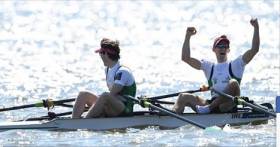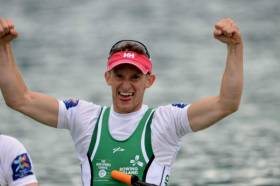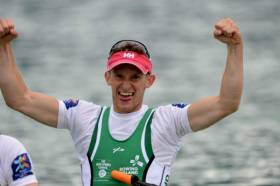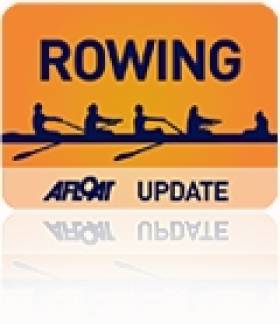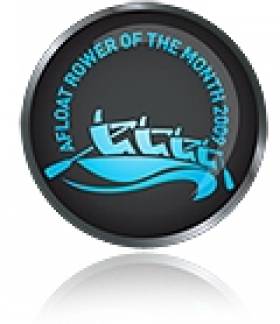Displaying items by tag: Gary O'Donovan
Irish Denied Bronze at Finish in World Cup Final
#Rowing: Ireland’s Paul and Gary O’Donovan finished fourth in the A Final of the lightweight double sculls at the World Cup in Lucerne this morning. France's new crew of Pierre Houin and Jeremie Azou were impressive winners, with Norway holding off charges by South Africa and Ireland in the final 250 metres to take silver. The young Ireland crew pushed hard but South Africa took the bronze by just over a second. Britain’s Will Fletcher and Richard Chambers were a length behind Ireland in fifth.
World Cup Regatta, Lucerne, Switzerland (Irish interest; selected results)
Men
Lightweight Pair – A Final: 1 Britain (J Cassells, S Scrimgeour) 6:31.03.
Lightweight Double Sculls – A Final: 1 France (P Houin, J Azou) 6:19.26, 2 Norway 6:21.81, 3 South Africa 6:22.42; 4 Ireland (G O’Donovan, P O’Donovan) 6:23.46, 5 Britain (W Fletcher, R Chambers) 6:25.72, 6 United States 6:28.08.
Women
Lightweight Double Sculls – B Final (Places 7 to 12): 1 Ireland (C Lambe, S Lynch) 7:01.36, 2 Poland 7:03.01, 3 Britain 7:04.88.
Gold for Ireland at European Rowing Championships
# Rowing: Paul O’Donovan and Gary O’Donovan took gold for Ireland at the European Rowing Championships in Brandenburg in Germany this morning. They executed the perfect plan in the final of the lightweight double sculls. Norway were the favourites, and led into the final quarter, but they could not deal with the tremendous finish of the O’Donovans. Germany came through to take silver, with Norway third.
European Rowing Championships, Brandenburg, Germany – Day Three (Irish interest; selected results):
Men
Lightweight Double Sculls – A Final 1 Ireland (G O’Donovan, P O’Donovan) 6:57.76, 2 Germany 6:59.54, 3 Norway 7:00.52.
Lightweight Pair – A Final: 1 Britain (S Scrimgeour, J Cassells) 7:00.38, 2 Denmark 7:03.94, 3 Spain 7:05.32; 4 Ireland (M O’Donovan, S O’Driscoll) 7:09.67
Women
Lightweight Double Sculls – B Final (Places 7 to 12): 1 Sweden 7:27.70, 2 Britain 7:27.99, 3 Ireland (C Lambe, S Jennings) 7:30.28.
Lightweight Single Sculls – A Final: 1 Germany (A Noske) 8:26.75, 2 Denmark 8:32.54, 3 Netherlands 8:37.05; 4 Ireland (D Walsh) 8:42.93.
Gary O'Donovan is Afloat Rower of the Month
#Rower of the Month: Gary O’Donovan is the Afloat Rower of the Month for March. The Skibbereen man had to compete in the lightweight single scull at the Ireland trials after his brother and crewmate, Paul, pulled out ill. Gary set excellent times, showing how much he has improved individually, in addition to being half of the crew of the lightweight double which will compete in international events in Europe in the summer and the Olympic Games in Rio de Janeiro in August.
Rower of the Month awards: The judging panel is made up of Liam Gorman, rowing correspondent of The Irish Times, and David O'Brien, editor of Afloat magazine. Monthly awards for achievements during the year will appear on afloat.ie and the overall national award will be presented to the person or crew who, in the judges' opinion, achieved the most notable results in, or made the most significant contribution to rowing during 2016. Keep a monthly eye on progress and watch our 2016 champions list grow.
Afloat Rowers of the Year Announced
#Rowing: The Afloat Rowers of the Year for 2015 are the Ireland men’s and women’s lightweight double sculls who qualified their boats for the Olympic Games in 2016.
Claire Lambe and Sinéad Jennings needed to finish in the top 11 at the World Championships in Aiguebelette in August/September. They seemed well-placed in their semi-final to qualify for the A Final, but were pushed into fourth as Canada finished with a remarkable sprint. The Ireland crew changed tactics for the B Final, and it worked. They finished ninth.
The men’s lightweight double of Gary and Paul O’Donovan had a similar qualification mark in Aiguebelette. To have a shot they had to finish in the top three in their quarter-final, and they achieved this, pushing Hayden Cohen and Peter Taylor of New Zealand into fourth. They finished fifth in their semi-final and then booked their Rio place with a fifth-place finish (11th overall) in their B Final, eking out a place ahead of Greece, who had finished eighth at the Olympic Games in London.
Afloat wishes both crews and all the Irish rowing community the very best in 2016.
Rower of the Year Award: The judging panel is made up of Liam Gorman, rowing correspondent of The Irish Times and David O'Brien, Editor of Afloat magazine. Monthly awards for achievements during the year appeared on afloat.ie. The overall national award has been given to the crews who, in the judges' opinion, achieved the most notable results and made the most significant contribution to rowing during 2015. Keep an eye on progress in 2016.
Lambe and O'Donovans Set New Personal Best Times in Indoor Tests
#Indoor Rowing: Claire Lambe excelled among a group of lightweight rowers who set personal best times in ergometer (rowing machine) tests at the National Rowing Centre in Cork. Gary O’Donovan, Mark O’Donovan and Shane O’Driscoll all set new best times. Paul O’Donovan did his test in Dublin and also broke new ground. Heavyweight rower Aifric Keogh matched her best time of six minutes 55.5 seconds.
High Performance Ergometer Testing, National Rowing Centre, Cork
Men
Lightweight: 1 G O’Donovan 6:13.7, 2 M O’Donovan 6:16.8, 3 S O’Driscoll 6:18.5.
Women
Open: A Keogh 6:55.5, L Kennedy 6:56.7.
Lightweight: C Lambe 7:05.6, S Dolan 7:15.3.
Irish Provinces Indoor Rowing Championships, University of Limerick (Selected Results; 2000 metres unless stated)
Men
Open – 1 R O’Hagan 6:09.4, 2 F Crowley 6:24.9, 3 A Prendergast 6:25.5. 30-39: G Conway 6:19.7. Open 500: R O’Hagan 1:19.6.
Under-23: A Kinneen 6:20.2. Junior 18: R Byrne 6:16.9, 500: E Walls-Tuite 1:22.3.
Jun 16: J Keating 6:33.8, 500: J McCarthy 1:29.8.
Jun 15 (1,000): R MacCurtain 3:23.6.
Freshers (1,000); G Barlow 3:05.2.
40-49: N Carey 6:24.3, 500: Carey 1:23.9. 50-59: O Short 6:46.9, 500: Short 1:29.4. 60-69: P Victory 6:57.6, 500 (60+): P Victory 1:32.6.
Lightweight – Open: D O’Connor 6:33.5, 500: L Keane 1:28.9.
Lightweight Under-23: L Keane 6:25.0, 500: Keane 1:28.9. Lightweight 40-49: J Doyle 6:29.1.
Women
Open – 1 M Dukarska 7:02.7, 2 A O’Sullivan 7:19.0, 3 M Piggott 7:34.7. 500: M Dukarska 1:33.6.
Under-23: S Bounane 7:18.7. Junior 18: M Cremin 7:23.3.
500: M Cremin 1:38.8.
Jun 16: A O’Farrell 7:32.7, 500: L Turner 1:44.1.
Jun 15: (1,000): A Doyle 3:50.6, 500: J Crowley 1:41.1
Freshers (1,000): B Chase 3:43.2.
30-39: S Kennelly 7:24.9. 40-49: P O’Brien 7:51.8, 500: R Ware 1:43.3. 50-59: M Lawlor 8:11.2, 500: Lawlor 1:55.9.
Lightweight – Open: S McCrohan 7:14.7, 500: K Wilkie 1:44.4.
Lightweight Under-23: E McGiff 7:49.2.
Lightweight 30-39: C Conway 7:48.3.
LTA – S McLoughlin 3:51.1, 500: McLoughlin 1:51.0.
Ulster Indoor Rowing Championships, Queen’s University, Saturday (Selected Results, 2,000 metres unless stated). Includes BUCS: British University Championships.
Men
Open: S McKeown 6:04.7, 2 M Christie 6:25.9. BUCS Open: 1 T Oliver 6:10.6, 2 P Doyle 6:26.9, 3 R Urquart 6:34.7. BUCS Lightweight: C Beck 6:31.2.
Under-23 Lightweight: A Laivinas 6:50.3.
Under-18: D Mitchell 6:26.0. Under-16: A Christie 6:39.3. Under-15: A Graham (1,000m) 3:32.7.
BUCS Beginners (1,000): J Lobinger 3:11.4.
Women
Open: R Maguire 7:15.4. BUCS Open: Maguire 7:15.4. BUCS Open Lightweight: R Brown 7:46.7.
Under-23: K Shirlow 7:28.3.
Under-18: F Chestnutt 7:31.0.
Under-16: L McIntyre 7:46.2. Under-15 (1,000m): A Hall 3:54.6. 30+ (1,000m): L Kerr 3:20.9.
BUCS Beginners (1,000m): A Druijff 3:45.8.
Two Ireland Boats Qualify for Olympic Games
#Rowing: Ireland qualified two boats for the Olympic Games at the World Rowing Championships in Aigubebelette in France. The lightweight men’s and women’s doubles had to finish in the top 11 to qualify, which meant a place in the top five of their B Finals.
The lightweight men’s crew of Paul and Gary O’Donovan took the final place. In a tense race, where the boats were tightly packed for much of the 2,000 metres, the O’Donovan’s sprinted to the line taking fifth just ahead of Greece – the margin was .28 of a second.
In the women’s race which followed, Ireland’s Sinead Jennings and Claire Lambe carved out a clear lead in the second quarter and held it until the pack caught them coming towards the line. However, the Irish were determined not to miss their chance, and took third behind China and Poland. This placed them ninth in the world.
World Rowing Championships, Aiguebelette, France – Day Seven (Irish interest)
Men
Lightweight Double Sculls – B Final (Places 7 to 12): 1 Poland 6:20.25, 2 United States 6:20.55, 3 Austria 6:22.04, 4 Switzerland 6:22.34, 5 Ireland (P O’Donovan, G O’Donovan) 6:23.20; 6 Greece 6:23.48.
Women
Lightweight Double Sculls – B Final (Places 7 to 12): 1 China 6:59.31, 2 Poland 7:00.37, 3 Ireland (C Lambe, S Jennings) 7:00.67, 4 Russia 7:00.79, 5 United States 7:02.21; 6 Sweden 7:02.45.
#ROWING: The Afloat Rowers of the Month for May are Paul and Gary O’Donovan. The brothers from Skibbereen formed the Ireland lightweight double which finished fifth at the European Rowing Championships in Poznan in Poland. They produced a very good performance in their semi-final to take third and so qualify for the A Final. In that race, they won a battle for fifth with Turkey. The winning crew, France, produced a European best time. The lightweight double is an extremely competitive event, but the new Ireland crew has hit the ground running.
Rower of the Month awards: The judging panel is made up of Liam Gorman, rowing correspondent of The Irish Times and David O'Brien, Editor of Afloat magazine. Monthly awards for achievements during the year will appear on afloat.ie and the overall national award will be presented to the person or crew who, in the judges' opinion, achieved the most notable results in, or made the most significant contribution to rowing during 2015. Keep a monthly eye on progress and watch our 2015 champions list grow.


























